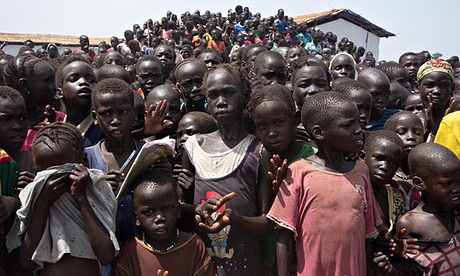* Stops short of vowing action, Ugandan troops already there
* Massacre of civilians in Bentiu provoked outrage
* Negotiations aimed at political reform resume Monday
By Richard Lough
NAIROBI, April 26 (Reuters) - Kenya's president said he would not let the conflict in neighbouring South Sudan descend into genocide, though he stopped short of spelling out any action to end the increasingly ethnic slaughter.
Four months of fighting between government and rebels in the world's newest nation has raised fears of a wider conflict that could further destabilise a fragile region and send hundreds of thousands more refugees over borders.
Uganda, another neighbour of oil-producing South Sudan, has already sent in troops to back the government. Regional bloc IGAD, which is brokering troubled peace talks, has said it will hold a meeting in coming days to "consider options".
"We refuse to be witnesses to such atrocities and to remain helpless and hopeless in their wake," Kenyan President Uhuru Kenyatta said in a statement late on Friday.
"We especially reject the possibility that we are creeping into genocide again in our region. We shall not stand by and allow it to happen."
Fighting began in December between troops loyal to South Sudan President Salva Kiir and his sacked deputy, Riek Machar. Clashes spread quickly beyond the capital, often pitting Kiir's Dinka people against Machar's Nuer.
The United Nations said rebels slaughtered hundreds of civilians when they seized the South Sudan oil hub of Bentiu earlier this month, hunting down men, women and children who had sought refuge in a hospital, a mosque and a Catholic church. The rebels dismissed the accusations.
Days later, Dinka residents of Bor town in Jonglei state attacked a U.N. base where about 5,000 people, mostly Nuer, were sheltering, the United Nations said.
Kenyatta's use of the word "genocide" has resonance in a region that has vowed never to see a repeat of the ethnic slaughter of hundreds of thousands of Rwandans twenty years ago.
The stalled talks are due to resume in Ethiopia on Monday to try and thrash out a deal on political reform after a long power struggle between Kiir and Machar triggered the unrest.
South Sudan's government, under growing pressure from regional and Western powers to end the conflict, on Friday released four senior political figures it had accused of helping start the violence in a bid to seize power.
Machar's negotiation team on Saturday welcomed the release of the four detainees - a former top ruling party official, national security minister, deputy finance minister and ambassador to Washington - after treason charges were dropped.
But rebel spokesman Hussein Mar Nyot said another of their key demands - the exit of Ugandan troops and other militia supporting the government - had not been met.
"If these forces from outside are withdrawn, this will give a very strong ground for peace to come," Nyot told Reuters.
U.S. Secretary of State John Kerry will travel next week to Ethiopia, another South Sudanese neighbour which is leading the mediation, to discuss peace efforts in the region.
South Sudan declared independence from Sudan in 2011 under the terms of a peace deal that ended decades of civil war fuelled by ethnicity, religion, ideology and oil rights. (Additional reporting by Aaron Maasho in Addis Ababa; Editing by Andrew Heavens)



